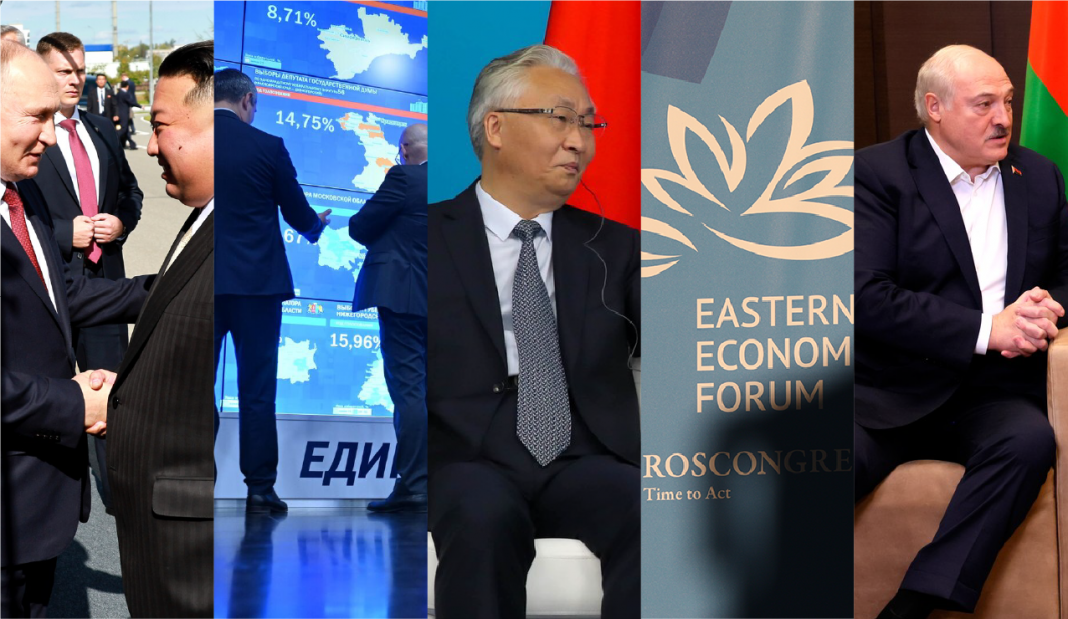This report describes the key events that significantly impacted Russia’s political, economic and social processes.
Based on the results of the past week, the following trends can be summarised:
- The results of the Single Voting Day in Russia demonstrated the stability of the Kremlin system and readiness to hold presidential elections in 2024. Despite many forecasts about the strengthening of opposition forces and protest sentiments, Russian society has demonstrated absolute amorphousness and actual agreement with the actions of the Kremlin. At the same time, it is becoming increasingly noticeable that any opposition in Russia (especially one that receives funding from external sources) has completely lost its position and no longer has any influence on the political processes in the country. Although it encountered some resistance, cleansing the opposition field became effective for the Kremlin.
- Putin’s public speeches increasingly come down to repeating the same theses: the Far East is developing at an accelerated pace; the future of Russia is logistics routes and energy; The United States lost its monopoly on hegemony; China is our friend and partner; Ukraine itself must declare its desire to sit down at the negotiating table; everything we do now will produce results only for future generations. In this context, it can be stated that it is these theses that the Russian president’s election campaign is being built on. Such a program is perceived very positively by Russian society.
- Alexander Lukashenko’s latest visit to Russia and meeting with Vladimir Putin demonstrates that integration processes within the Union State do not stop and are developing as planned. As Ascolta has repeatedly noted, the integration’s political part could happen at the end of this year or the beginning of 2024. If such a forecast is realised, the presidential elections in Russia and several other internal political processes will be questioned.
This digest highlights the following topics that were most relevant for Russia during 11th – 17th of September:
1. Results of the Single Voting Day in Russia;
2. Plenary meeting of the Eastern Economic Forum;
3. Meeting of Vladimir Putin with Deputy Prime Minister of the State Council of the People’s Republic of China Zhang Guoqing;
4. Visit of Chairman of State Affairs of the DPRK Kim Jong-un to Russia;
5. Visit of Alexander Lukashenko to Russia;
6. Article by Nikolai Patrushev;
7. Return of General Surovikin to the public.
This Content Is Only For Subscribers
- Results of the Single Voting Day in Russia
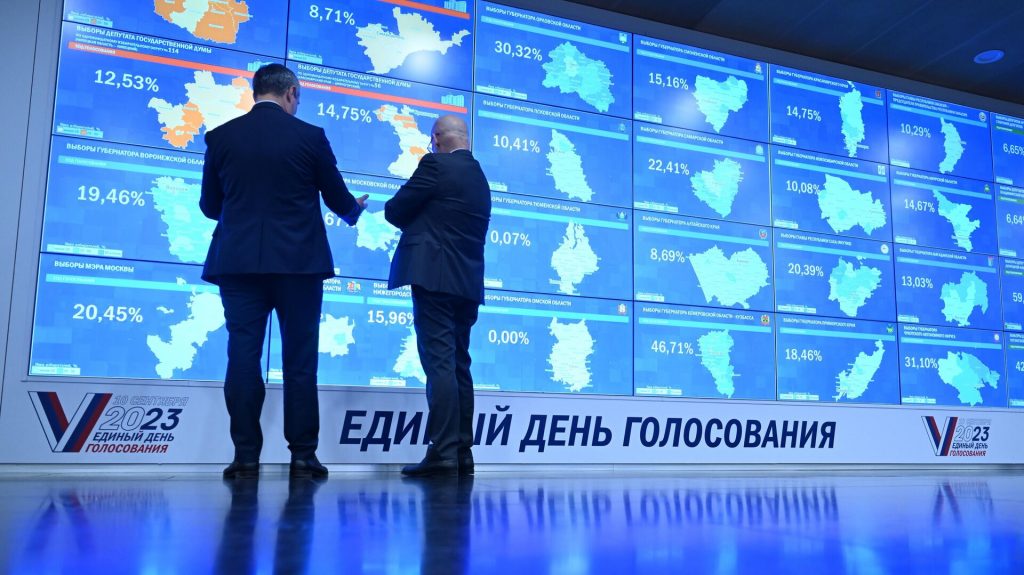
From September 8 to 10, local elections were held in most regions of Russia and in the temporarily occupied territories of Ukraine (part of the Donetsk, Zaporizhzhia, Luhansk and Kherson regions). According to official data published by the Central Election Commission of the Russian Federation, election campaigns of various levels took place in 85 constituent entities – the only exceptions were Kabardino-Balkaria, Mari El, St. Petersburg and the Yamalo-Nenets Autonomous Okrug (Yamalo-Nenets Autonomous Okrug).
Residents of Russia elected the 21st governor and deputies of 20 regional parliaments. More than 4,000 election campaigns were held nationwide, in which over 81 thousand candidates participated, vying for 34 thousand different mandates and positions.
Outcomes and outlook:
A single voting day in Russia is actually the final test of citizens’ electoral sentiments ahead of the presidential elections scheduled for March 2024. The voting results, following which all governors retained their positions, demonstrated two main results – electoral sentiment (public agreement with the current state of affairs) and the effectiveness of the Kremlin technologists (the proper functioning of the multi-level network of agitators, technologists, the system of bribing voters and vote rigging).
Russian media actively quote the closed report “Single Voting Day – 2023. Results,” which was sent to all members of the United Russia party and included the main results of the elections. The main results of the report were several points. Firstly, there is an increase in overall turnout, which, according to official results, was the highest since 2017 – 43.5% (in 2022, it was 35%).
Secondly, there is a general strengthening of the ratings of United Russia itself, which was able to retain all its governors in place and expand its presence in local legislative assemblies.
Thirdly, the emphasis on criticism of the Communist Party (CPRF), which, although it was able to retain two governors in place, has noticeably sagged in the issue of forming deputy corps at the regional level. The report describes the election result for the Communist Party of the Russian Federation as the worst in recent times. It is noted that even according to the results of the elections in Khakassia, where the governor from the Communist Party of the Russian Federation won, his support was the lowest among all other governors in 20 regions – 63.14%.
In general, the results of the Single Voting Day demonstrated the readiness of the system to hold presidential elections in 2024. Neither the activation of the radical-patriotic wing nor opposition structures (foreign agents) nor current socio-political events could demonstrate a severe threat to the Kremlin.
Based on the election results, it is possible to predict the strengthening of the positions of both Sergei Kiriyenko, who is one of the main ideologists of regional policy in Russia, and Alexander Kharichev, who is considered responsible for the work of technologists and electoral networks at both the regional and central levels.
Also, holding elections in the occupied territories and co-opting newly elected “deputies” into the State Duma will lead to the Russian parliament finally losing legitimacy in the eyes of several states – primarily the West.
- Plenary meeting of the Eastern Economic Forum
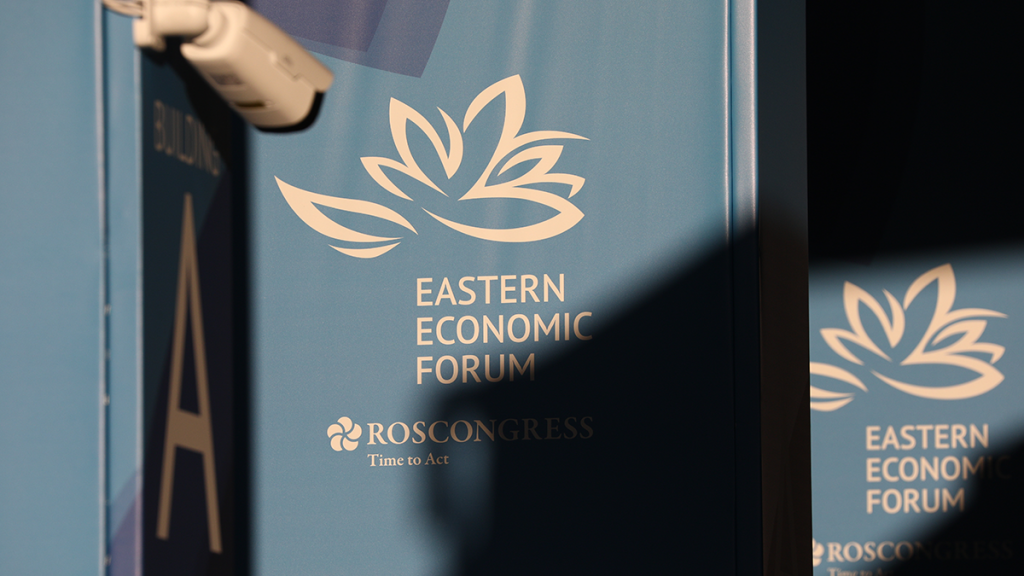
Last week (September 11-13), the annual Eastern Economic Forum took place on Russky Island in the Primorsky Territory of the Russian Federation. The critical event of the forum was the plenary session with the participation of Vladimir Putin and Vice President of the Lao People’s Democratic Republic Pani Yathothu, which took place on Tuesday, September 12.
During his speech at the plenary session of the Eastern Economic Forum, Vladimir Putin touched upon several issues related to both the development of the Far Eastern region and general political events in Russia and the world.
Putin’s key theses:
- “The Far East for Russia is a strategic priority for the 21st century; we will not deviate from this.”
- “In essence, a new model of relationships and integration is being born, but not according to Western patterns, for the elite, for the chosen “golden billion,” but for all of humanity, for the entire functioning and developing multipolar world.”
- “The Far Eastern Federal District is 40 per cent of the territory of the Russian Federation. Here are almost half of our forests and gold reserves, more than 70 per cent of fish, diamonds, over 30 per cent of titanium, copper, etc. The most important strategic enterprises, seaports and railways operate. In a word, the role of the Far East for our country, its future, and Russia’s position in a multipolar world is extremely great.”
- “Thanks to state support for Far Eastern projects, investment agreements worth more than 7.7 trillion rubles have been signed, of which 3.4 trillion have already been invested. One hundred twenty-five thousand jobs were created, and about 700 new enterprises began operating. These include such landmark projects as a gas processing plant – one of the largest in the world, and a gas chemical complex in the Amur region, the Nakhodka mineral fertiliser plant and the Zvezda large-tonnage shipyard – here, very close. Deposits of copper and other minerals are being developed: Udokanskoye, Baimskoye, Malmyzhskoye.”
- “We plan to connect the Power of Siberia and Sakhalin-Khabarovsk-Vladivostok gas pipelines and include them in the country’s unified gas supply system. To solve, I’m not afraid of this word, a historical, global task for our country – to integrate the gas transportation networks of the west and east of the Russian Federation into one whole.”
- “By 2030, we expect to double the total capacity of seaports in the Arctic basin. If it amounted to 123 million tons last year, then by the end of the decade, it should reach 252 million tons, including through the construction of new terminals and the expansion of railway approaches.”
- “We will continue to modernise the BAM and Trans-Siberian Railways. The pace here, of course, needs to be increased, including through concession mechanisms and attracting private capital to construct bridges, tunnels and overpasses.”
- “In this regard, I would like to note that, at the initiative of private investors, the Pacific Railway is being built, and a new port is being built on the coast of the Sea of Okhotsk. This will allow us to use the resources of Yakutia and the north of the Khabarovsk Territory and provide direct access to the Asia-Pacific markets.”
- “Quite recently, we opened a section of the expressway from Moscow to Arzamas. By the end of this year, the route will reach Kazan and then Yekaterinburg and Tyumen. I would like to say today that we will certainly continue this large-scale project: high-speed highways will pass through Siberia, the Far East and the Pacific Ocean. A single transport corridor, “Russia”, will be formed from St. Petersburg to Vladivostok.”
- “The Far East should not only be a territory of rapid economic, social sphere and urban environment development. Behind these plans and projects, we must not lose sight of the concern for unique ecosystems and the conservation of hundreds of rare species of plants and animals.”
- “Restrictions, for example, on payments in dollars. Where does this lead? Moreover, all countries are thinking about creating their own instruments, about creating new payment systems, thinking about whether it is worth keeping their savings in the States or somewhere in Europe, whether it is worth investing in the securities of these countries saving”.
- “North-South” – we go along this corridor to the Persian Gulf and there to India. Suppose there is another route, and Israel, in my opinion, is also involved. In that case, we can go through the Black Sea to the Mediterranean and use this corridor.”
- “No, any deprivatisation is planned; no deprivatisation will happen, I can tell you that for sure. The fact that the prosecutor’s office is actively working in certain areas, in individual companies – law enforcement agencies have the right to assess what is happening in the economy in specific cases, but this is not related to any decisions regarding deprivatisation. This will not happen, and [Prosecutor General] Igor Viktorovich [Krasnov] knows my position.”
- “Space is a complex and responsible job, associated, of course, with high technology. We don’t just have experience here; we have excellent competencies. As for landing on that site, where no one has ever landed on the moon before, this is a difficult job; of course, the corresponding analysis will be carried out there, and the work will continue. It’s a pity that the lunar landing did not occur, but this does not mean that we will complete this program – we will continue to work. But haven’t any emergencies of this kind in other countries, even more severe ones, with dire consequences?”
- “What we should pay attention to here is life expectancy; it is growing in our country. In 2021, it was 71 years old, the average life expectancy in the country, and now it’s more than 73, in my opinion, even 73.6. There was a moment, in my opinion, in June of this year – it was even a little over 74 if you count year by year.”
- “In general, we don’t have that many migrants working in the labour market – that’s 3.7 per cent of the total number of workers, and we have workers somewhere. I don’t remember how many, more than 12 million. Therefore, this is a sensitive issue related to the economy, the social sphere, and the moral state of society.”
- “By the way, it’s easier for us than for European countries or the United States because we have an influx from the former republics of the Soviet Union. Firstly, it’s easier for us to work with them; the leaders of these countries understand everything and are ready to cooperate with us.”
- “I think there will be no fundamental changes in the Russian direction in US foreign policy, no matter who is elected President. True, Mr. Trump says he will solve pressing problems in a few days, including the Ukrainian crisis. Well, this cannot, but please, this is good. But for us, by and large…”
- “Everything that is happening with Trump is political persecution of his political rival. That’s what it is. And this is done in front of the United States and the world’s public eyes. They simply exposed their internal problems. And in this sense, if they try to fight us, it’s good because it shows, as they said back in Soviet times, the bestial appearance of American imperialism, the bestial grin.”
- “As soon as Russia became stronger, became a real geopolitical competitor—namely a competitor—the policy of containing Russia immediately began. Just as today, the West is trying to restrain the development of China because it sees that China, under the leadership of the CPC and the leadership of our friend and Chairman of the People’s Republic of China, is developing by leaps and bounds. This shocks them, and they do everything to slow down China’s development. But this cannot be done; they are too late. That’s it, the train has left. This is an objective process.”
- “What is a foreign agent in Russia? This is a person who is engaged in public activities for the money of a foreign state. This law does not even prohibit him from further engaging in this activity; it only requires that the person open sources of financing. We know very well what is there: whoever pays calls the tune. If they pay here, within the country, to those people who are engaged in public activities, then at least show the source of your funding. There’s nothing like that here.”
- “As for the negotiation process: if the United States believes that Ukraine is ready for negotiations, then let them cancel the decree of the President of Ukraine, which prohibits negotiations. There, the President issued a decree forbidding negotiations for himself and everyone else. Blinken says they are ready. Let this decree or decree, as they call it, be cancelled first; this is the first step.”
- “In my opinion, it is clear to me and many others: Ukraine is conducting a so-called counter-offensive. There are no results, of course. Now, we will not say failure, no failure – no results. There are big losses. Since the beginning of the counter-offensive, personnel losses have amounted to 71.5 thousand people. Moreover, at any cost, as they say, they want to achieve results. Sometimes, you get the impression that these are not their people at all, whom they are throwing into this counter-offensive as if they are not their people at all; this is so… The commanders are just telling me from the battlefield. It is amazing!”.
- “The losses are large there: in tanks – 543 tanks have already been lost, in armoured vehicles of various classes – almost 18 thousand, and so on. Therefore, as Western curators push them, one gets the impression that they want to “gnaw off” [the territories] as much as possible, excuse the bad manners, and what they can do. And then, when all resources: human resources, equipment, and ammunition are close to zero, achieve a stop in hostilities, say: we have been saying for a long time that we want negotiations, and begin these negotiations to replenish their resources and restore the combat effectiveness of their armed forces.”
- “Listen, from all sides, from many sides, those people with whom we communicate, [who] act or would like to act as mediators, say to me: are you ready for a cessation of hostilities? How can we stop hostilities if the other side is launching a counter-offensive? What should we do? They will counter-attack, and we will say: we will stop. We are not Trotskyists: the movement is everything, the final goal is nothing. This is a bad theory.”
- “More recently, the US Administration believed that using cluster munitions is a war crime; they publicly said so. Now they are supplying cluster munitions to the war zone in Ukraine.”
- “They are going to supply F-16s. Will this change? No. This simply prolongs the conflict. Their election process begins in November; they must show some results at all costs. And they push the Ukrainians to continue hostilities, no matter what they say publicly because they don’t feel sorry for the Ukrainians. Oddly enough, today’s Ukrainian leadership does not feel sorry for its people; they simply throw them into a furnace.”
- “Quite recently, on our territory, the Federal Security Service killed several people during a clash and captured the rest. It turned out that this was a sabotage group of Ukrainian special services. Interrogations are underway. What do they show? Their task was to cause damage to one of our nuclear power plants, undermine power lines and high-voltage power lines, and ultimately disrupt the power plant’s operation. And this is not the first such attempt. At the same time, during interrogation, they testified that they trained under the guidance of British instructors. Do they even understand what they are playing with or not? Are they provoking us to take some kind of retaliatory action against Ukrainian nuclear facilities and nuclear power plants?”
- “People come to the military registration and enlistment offices and sign contracts. 270 thousand people. Moreover, this process continues with us. Every day, 1000-1500 people come to sign a contract.”
- “Let’s wait for scientists from the future. Only future generations can objectively evaluate what we have done for the country.”
Outcomes and outlook:
Ten years ago, in December 2013, Vladimir Putin declared the Far East and the Arctic priority regions for Russia in an address to the Federal Assembly. At the same time, Yuri Trutnev was appointed plenipotentiary representative of the Far Eastern Federal District. In fact, Trutnev himself is one of the key beneficiaries of the Eastern Economic Forum, using this platform to attract additional investments and resources for the development of the Far Eastern Federal District and to increase his own positions in Putin’s inner circle.
As part of the eighth Eastern Economic Forum, several events were held in which foreign delegations and representatives of local businesses took part. Vladimir Putin’s active participation in meetings and presentations confirms that this region and its potential are significant for Russia. Moreover, in the run-up to the presidential elections, Putin personally tried to dispel the stereotype that Russia is gradually losing control of the Far East, which the Chinese actually occupy.
Vladimir Putin’s speech at the plenary session of the Eastern Economic Forum, as usual, touched on a number of areas and was not limited only to the Far East or economic issues. In general, the Russian president’s more than two-hour speech can be boiled down to several theses:
- The Far East is developing at an accelerated pace.
- The future of Russia is logistics routes and energy.
- The United States lost its monopoly on hegemony.
- China is our friend and partner.
- Ukraine itself must declare its desire to sit down at the negotiating table.
- Everything we do now will produce results only for future generations.
Analysing Putin’s statements, we can talk about an attempt to play in two main directions at once: internal – active inclusion in the election campaign and an effort to demonstrate the stability of the system in the face of Western sanctions and restrictions (it is noteworthy that Putin appeals to the fact that improvements will be felt only by the next generations, rather than the most satisfies one of the critical mental needs of Russian society). Externally, this is another demonstration of Russia’s turn towards Asia and the active development of new transport routes, which should completely change logistics routes around the world. In this case, it is essential to note that the development of the Arctic is indeed a strategic advantage for Russia. However, in this direction, there are several points that create additional difficulties for Moscow (from the ambitions of China to the activities of the Scandinavian countries, Great Britain and the USA).
At the same time, it can be noted that the Kremlin’s strategy to prolong the fighting in Ukraine as much as possible and transfer the conflict with the West to a permanent state is gradually demonstrating its results. Thus, Russian society, which is more resistant to crises and declining living standards, demonstrates its readiness for further escalation and prolonged conflict. Public sentiment remains of no concern to Kremlin technologists. The results of the recent elections showed that everyone who opposed Putin’s policies left Russia (however, there were not so many of them). At the same time, the rest either supported the Kremlin’s policies or resigned themselves to its hopelessness.
- Meeting of Vladimir Putin with Deputy Prime Minister of the State Council of the People’s Republic of China Zhang Guoqing

On Tuesday, September 12, on the sidelines of the Eastern Economic Forum, Vladimir Putin met with Deputy Prime Minister of the State Council of the People’s Republic of China Zhang Guoqing. During the meeting, the parties exchanged views on the importance of the development of the Arctic. Also, they discussed the prospects for further cooperation in this direction.
Key statements:
- Putin: “I would like to immediately note that thanks, first of all, to the efforts of our governments and business circles, relations between Russia and China in this area – the area of economic cooperation – have reached a very high level. Of course, this is all a derivative of what has been achieved in the political field, but the results are more than good; they are excellent. Every year, we add almost one-third of trade turnover.”
- Zhang Guoqing: “Our relations maintain high and progressive dynamics. As you rightly noted, our countries provide strong mutual support on issues affecting each other’s key interests. Political interaction and trust are deepening, common interests are multiplying, and our people are drawing closer together. Multifaceted practical cooperation is steadily advancing, and the scope of bilateral interaction constantly expands.”
Outcomes and outlook:
In general, it is essential to note that this year’s Eastern Economic Forum, despite the pompous organisation, was ignored by many foreign participants and high-ranking guests. Of course, one should not downplay Zhang Guoqing’s position in the hierarchy of the Communist Party of China. Still, in 2018, Xi Jinping personally visited the WEF, and in 2020, he took part in the forum via video link.
The fact that in 2023, the Chinese delegation was headed by a politician responsible for industry in the PRC may indicate China’s extremely pragmatic goals regarding cooperation with Russia on several joint projects in the Far East and the Arctic. In fact, China has no political or controversial issues in this direction.
On the other hand, this direction’s economic component is significant. The joint development of logistics routes and active development of the Arctic are already showing tangible results that challenge classical trade routes. In essence, we are dealing with the dynamic development of the Arctic, in which Russia. However, it has an advantage in geographical location and is still forced to play an extremely cautious game with China, risking losing its position.
The first result of this meeting was the dispatch of several tankers with oil along the northern sea route, not protected by additional armour in case of sudden frosts. The main emphasis is on the fact that the northern sea route is the shortest and most economically profitable (savings on one vessel are up to 500 thousand dollars per voyage).
- Visit of Chairman of State Affairs of the DPRK Kim Jong-un to Russia
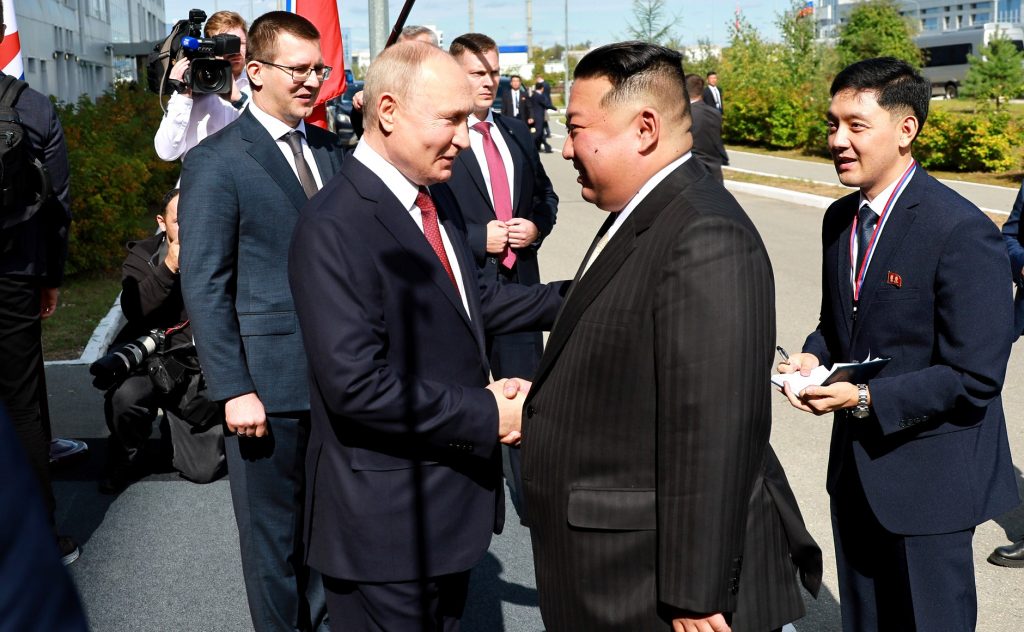
On Wednesday, September 13, Chairman of State Affairs of the DPRK Kim Jong-un arrived on an official visit to Russia. At the Vostochny cosmodrome in the Amur region, he met with Vladimir Putin. The leaders of the two states inspected the new missile systems, held a joint lunch, and also held a closed round of negotiations. After negotiations with Putin, Kim Jong-un met with Russian Defense Minister Sergei Shoigu. Later, they visited the Pacific Fleet, the frigate “Marshal Shaposhnikov”, and the Knevichi airfield. The DPRK leader also watched the ballet “The Sleeping Beauty” on the Primorsky stage of the Mariinsky Theater, met with North Korean students of the Far Eastern Federal University, and finally attended a marine mammal show at the Primorsky Aquarium. Kim Jong-un’s visit to Russia lasted until Sunday, September 17.
Key statements:
- Putin: “This year, Russia and the DPRK are celebrating a significant anniversary – 75 years [of establishing] diplomatic relations. The Soviet Union was the first to recognise the young Democratic People’s Republic of Korea. Our relations were founded during Korea’s struggle for freedom in 1945 when Soviet and Korean soldiers crushed the Japanese militarists shoulder to shoulder.”
- Putin: “In Korea, there is a proverb: new clothes are good, but old friends are good.” And among our people, they say that an old friend is better than two new ones. These folk wisdom are fully applicable to modern relations between our countries.”
- Kim Jong-un: “First of all, let me express to you, Comrade Putin, my sincere gratitude for the fact that you kindly invited us; despite being busy and managing all the affairs of the state, you sincerely show us warm hospitality.”
- Kim Jong-un: “Comrade Putin and I just discussed in depth the military-political situation on the Korean Peninsula and in Europe and came to a satisfactory consensus on further strengthening strategic and tactical cooperation, support and solidarity in the struggle to protect the sovereign right of security, to create guarantees of lasting peace both in the region and throughout the world. We are confident that the Russian army and people will certainly win a great victory in the sacred struggle to punish the gathering of evil that claims hegemony and feeds the expansionist illusion and to create a stable environment for development.”
- Kim Jong-un: “From the first moment I arrived on Russian soil, I felt the fighting spirit and vibrant reality and became a direct witness to the significant achievements of the Russian people in building a strong modern Russia under the correct leadership of Comrade Putin. “I am deeply convinced that the heroic Russian army and people, brilliantly inheriting the traditions of victory, will confidently demonstrate the priceless virtue of honour on two fronts – a special military operation and building a strong state.”
Outcomes and outlook:
Against the backdrop of Kim Jong-un’s visit to Russia and his negotiations with Vladimir Putin, the main topic discussed in Western media was the issue of the possible transfer of North Korean stockpiles of Soviet-style weapons for the needs of the Russian army in Ukraine. This topic was actively discussed even before the start of the visit, provoked a great stir and made the visit of the North Korean leader one of the main events of the past week.
The visit itself was not particularly important. Moreover, after a few days of Kim Jong-un’s stay in Russia, it seemed that his main goal was to meet not with Putin but with Defense Minister Sergei Shoigu, who not only attended Kim Jong-un’s negotiations with the Russian president but also prepared for North Korean leader program for several days, accompanying him at all public events. It is important to note that the day before Shoigu visited the DPRK, he also took part in several events together with Kim Jong-un.
On the other hand, the emphasis, including by the Western media, on military topics and the possible transfer of North Korean weapons to the Russian army looked too feigned and as if it was specially replicated to cover up the fundamental goals of the visit.
At the same time, several Ascolta sources noted that the primary purpose of Kim Jong-un’s visit to Russia could be to discuss the supply of sanctioned products from China to Russia through North Korea. Allegedly, for this purpose, in recent months, the Russian media have especially promoted information that North Korea, despite sanctions pressure, managed to establish its production of microchips and other electronics that can be used, including for missiles and other types of weapons.
In this way, China is allegedly trying to avoid direct accusations of being involved in the conflict on Russia’s side. It will send the necessary electronics to the DPRK, where they can be branded under local companies and then sent to Russia. In turn, Russia undertakes to provide the DPRK with humanitarian aid and food supplies to combat the consequences of the recent typhoon, which caused significant damage to civilian infrastructure.
If such information is confirmed, soon, we will be able to observe an increase in the pace of production of Russian missiles, in which North Korean electronics will demonstratively appear.
- Visit of Alexander Lukashenko to Russia
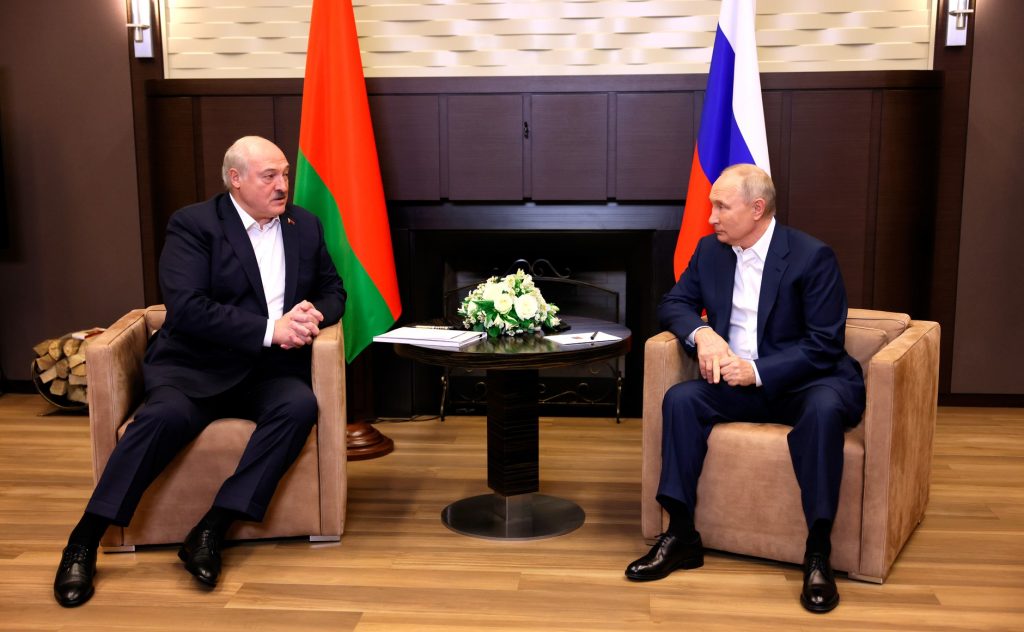
On Friday, September 15, Vladimir Putin met with President of Belarus Alexander Lukashenko at the Bocharov Ruchey residence in Sochi. During the open part of the negotiations, the parties discussed economic issues and the process of further integration within the Union State. The leaders of the two states also held closed negotiations, which resulted in a press conference.
Key theses:
- Putin: “Just recently, I had a meeting with the leader of the Democratic People’s Republic of Korea. I would like to inform you about how the discussion went on on the situation in the region, which is also important, and, of course, on our most pressing issue – the situation in the Ukrainian direction, around the Ukrainian crisis.”
- Lukashenko: “First of all, I want to congratulate you on such a serious stage of the electoral cycle: a single voting day has passed in many regions. The results are clear; I don’t even want to analyse them: probably, such results have never happened. And for the President, first of all, the people supported all your candidacies for the position of governor. This is a great success.”
- Lukashenko: “In detail, all the issues – starting from the military-industrial complex and other things related to the Ukrainian conflict – all these issues have been practically resolved. If something is left, we know in which direction we should move.”
- Putin: “I was at our two largest gas and gas chemical construction projects. I would like to say about the restrictions being imposed on us: European companies refused to supply equipment, hoping we did not have enough competencies. We have restored all competencies, absolutely everything. The schedule has been shifted a little to the right for several months. Huge, global-scale enterprises will be introduced very soon.”
- Putin: “There is one country that believes it is exceptional: the United States. Even what she considers a crime, she allows herself to do because it is the United States that uses cluster munitions, in this case, simply at the hands of the Ukrainian army. This country believes that this is a crime. Still, it allows itself to do it, and this is precisely the main problem of today’s international relations. And therefore, the overwhelming majority of participants in international communication are fighting with us to create a multipolar world since this situation suits almost no one.”
- Putin: “We have never refused negotiations. Therefore, if the other side wants to let him do it, say so directly. So I’m talking, but we don’t hear something from the other side.”
- Lukashenko: “It seems they started dancing; three rounds of negotiations took place in Belarus, then in Istanbul, and then [US Secretary of State Anthony] Blinken and [US Secretary of Defense Lloyd] Austin Zelensky were given a command, and he forbade negotiations. The facts are on the table; the facts are there. So what’s the point of accusing someone?”
- Putin: “We don’t have such a need to invite people from outside to fight. Moreover, I want to emphasise this again: 300 thousand people signed contracts and came as volunteers. And what’s more: the units being formed are equipped with modern weapons and equipment; some are already 85–90 per cent equipped.”
Outcomes and outlook:
Lukashenko’s visit is notable for the seemingly casual phrases – about implementing the agreements on the Union State by 80% and that “there are still three months left.” That is, it can be assumed that by the New Year, Lukashenko and Putin may announce the completion of the creation of some version of the confederation and the completion of the first stage of “gathering lands.” Another important point is that at the meeting in Sochi, they started talking about building a formal Minsk-Moscow-Pyongyang axis, which also focused on alliance and patronage from China. This important geopolitical aspect can lead to apparent changes in world architecture: instead of the operatic CSTO; there may be an alliance of nuclear states with an openly anti-Western and anti-democratic ideology.
- Article by Nikolai Patrushev
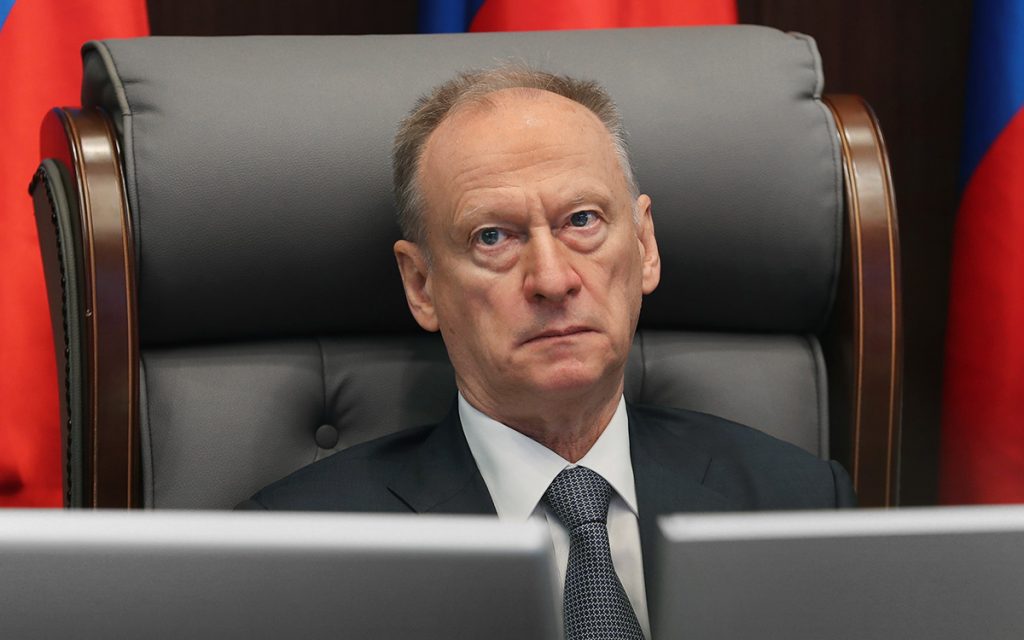
On Friday, September 15, the next issue of the Russian magazine “Razvedchik” was presented, in which, among other things, a policy article by the Secretary of the Security Council of the Russian Federation Nikolai Patrushev “The Collapse of Parasitic Empires” was published. In the article, in a form familiar to Russian officials, Patrushev criticises the Western power system and notes the collapse of the unipolar world.
Key theses:
- “The collapse of the USSR led to a shift in the balance of power, and fighters for dominance hastened to take advantage of this opportunity to strengthen their dictatorship over the rest of the world. Today, the United States and Europe are spending enormous resources on searching for and educating so-called young democratic leaders in specialised educational centres, which will then be used to organise coups d’etat to form Western-dependent regimes in previously independent states. It has become commonplace that “leaders” trained in this way turn out to be ordinary puppets, receiving money and instructions from the CIA, MI6 and other Western intelligence agencies.”
- “Westerners gain additional leverage by being involved in training promising managers and representatives of law enforcement agencies, who then become conductors of harmful ideas to the detriment of the national interests of their states. In recent years, hundreds of employees of foreign intelligence services, as well as other persons involved in organising intelligence and subversive activities against our country and our strategic partners, have been identified and neutralised.”
- “The policy-making circles of the United States have convinced themselves of America’s supposedly special messianic destiny – to rule the world through a strong foreign policy, without recognising anyone’s interests. They actively interfere in internal processes throughout Latin America, Africa and Asia and build new alliances for themselves. Among them are the AUKUS trilateral partnership with the UK and Australia and the US-Japan-ROK triangle, which are aimed at China, Russia, North Korea and other countries in the region that do not obey the will of Washington. In the Asia-Pacific region, the White House is obsessed with creating a networked security structure in which Tokyo plays a significant role. Plans are being hatched to create a NATO branch in the Asia-Pacific region.”
- “The expansion of the US military machine is accompanied by a forced reformatting of the mentality and spirituality of the population of all countries in which the Anglo-Saxons intend to expand their influence. False ideas and values designed to consolidate the neocolonial claims of the West are systematically and obsessively implanted into their public consciousness.”
- “First of all, these are the ideas of globalism, the complete opposite of patriotism, which does not recognise the diversity of cultures and ways of life and is designed to forcefully drive all countries and peoples under the banner of Western consumer civilisation. In addition, this is already tired of propaganda of false theories of gender diversity with the invention of dozens of genders and the ability to change a person’s biological parameters at a whim or even under duress. Finally, this is the development and imposition of insane pseudo-ecological doctrines designed, under the slogans of nature conservation, to justify the need for a radical reduction in the human population.”
Outcomes and outlook:
Nikolai Patrushev has recently been trying to act as the leading Russian ideologist who sets the tone, the mainstream line for other ideologists. In essence, Patrushev is turning into the Suslov of the Putin era. His ideas are not new; he has made similar theses before. But this article shows one ideological feature of modern Russia: Putin and his regime are trying to show that they are the main barrier to globalism, the main antipodes of globalism. Declaring patriotism as the opposite of globalism is a reasonably new move, with the help of which, shortly, Russia will try to justify all processes occurring both within the country and outside its borders. The world will now be divided not into the West and the Global South but into “globalists” and “patriots.”
- Return of General Surovikin to the public
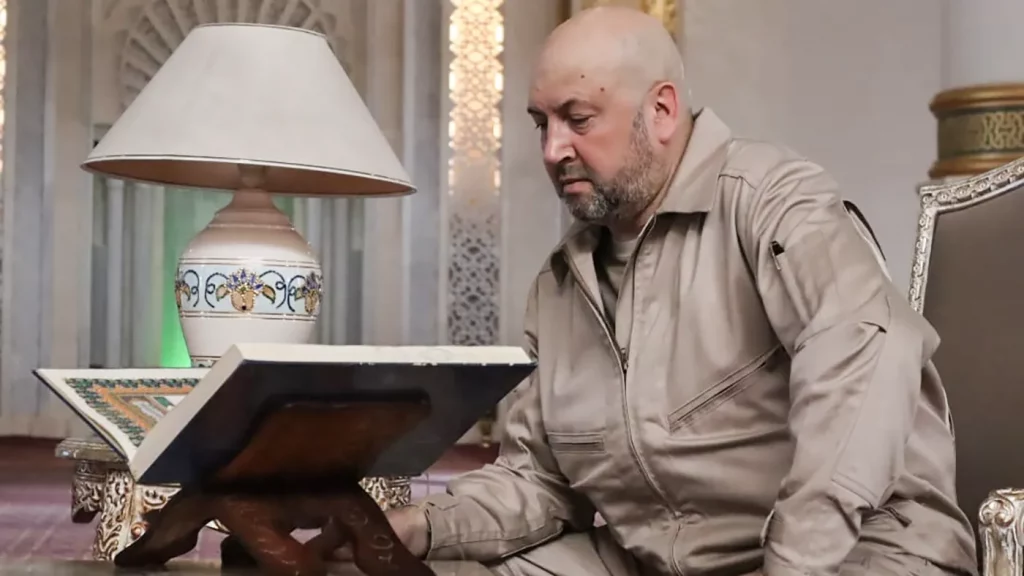
On Thursday, September 14, a photograph appeared online that allegedly pictured General Sergei Surovikin during a meeting with the military (judging by the uniform from another country). Later, several sources stated that Surovikin was in Algeria. This information was confirmed on Friday, September 15, when several more photographs appeared on the Internet in which Surovikin, as part of the delegation of the Russian Ministry of Defense, holds meetings with the military leadership of Algeria.
Notably, a few days before this, information appeared on the Internet about the appointment of Surovikin to the post of head of the CIS Coordination Committee on Air Defense Issues. However, this information was later denied.
Outcomes and outlook:
The appearance of General Surovikin in public is not accidental. It is important to note that in the photographs, he is not dressed in military uniform and acts as an unofficial representative of the delegation (it is noteworthy that in the previously published picture with his wife, Surovikin was not in military uniform).
At the same time, the very successive appearance of photographs on the Internet may indicate a deliberate attempt to test public opinion and the reaction of specific population groups to Surovikin’s return to the public plane.
It is too early to judge the purposes of such technology. Still, it can be assumed that Surovikin’s previously announced nominal position in the CIS Air Defense Committee is too close to the “Armageddon” general. Already, a number of Ascolta sources note that Surovikin could lead the Russian private military campaign in Africa or even become the head of the Wagner PMC, taking on both the responsibilities of Dmitry Utkin (military leadership and plating) and Yevgeny Prigozhin (management, business management, public activity).
If such information is realised, it can be assumed that a study of public opinion and a complete reformatting of the PMC system in the structure of the MTR of the Russian Federation is currently underway.

